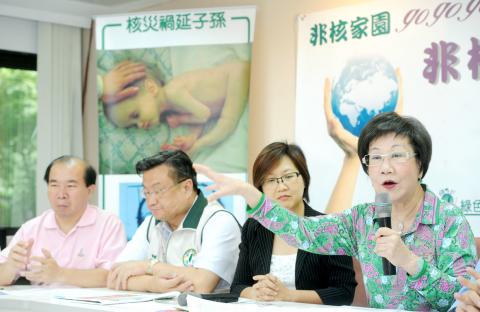As part of ongoing opposition to the government’s nuclear policy Former vice president Annette Lu (呂秀蓮) yesterday launched a petition in Taipei for a nuclear referendum to decide whether fuel rods should be inserted into the Fourth Nuclear Power Plant in New Taipei City’s (新北市) Gongliao District (貢寮).
Lu, joined by several Democratic Progressive Party (DPP) Taipei City councilors, said the Taipei City Council passed a regulation on civil referendums in Taipei, and she expected to collect 15,000 signatures in the city for her proposed referendum to be approved.
A similar referendum she proposed in New Taipei City was rejected by the Executive Yuan’s Referendum Review Committee last month, which said the issue “concerns energy policy affecting the nation’s electricity supply, power reserves, industrial sectors, environment and other important matters” and is “an important national policy matter not suitable for a local referendum.”

Photo: Wang Min-wei, Taipei Times
She slammed the Executive Yuan yesterday over the rejection, and said she will file an administrative lawsuit against the committee or request a constitutional interpretation.
In launching the petition for a proposed nuclear referendum in Taipei City, the former vice president said that residents living within the evacuation zone of the Fourth Nuclear Power Plant, including Taipei, New Taipei City, Keelung City and Yilan County, should have the right to determine whether they want to face threats of a possible failure at the plant.
“President Ma Ying-jeou (馬英九) failed to mention the nuclear waste issue during his nuclear trip and he did not talk about the fact that Taiwan is in a seismic zone. His remarks are meant to mislead the public,” she said at the Taipei City Council.
She said the Ma administration should stop attempting to coerce the public into approving construction of the Fourth nuclear Power Plant, and urged the government to speed up the development of solar power and other alternative energy sources.

A preclearance service to facilitate entry for people traveling to select airports in Japan would be available from Thursday next week to Feb. 25 at Taiwan Taoyuan International Airport, Taoyuan International Airport Corp (TIAC) said on Tuesday. The service was first made available to Taiwanese travelers throughout the winter vacation of 2024 and during the Lunar New Year holiday. In addition to flights to the Japanese cities of Hakodate, Asahikawa, Akita, Sendai, Niigata, Okayama, Takamatsu, Kumamoto and Kagoshima, the service would be available to travelers to Kobe and Oita. The service can be accessed by passengers of 15 flight routes operated by

MORE FALL: An investigation into one of Xi’s key cronies, part of a broader ‘anti-corruption’ drive, indicates that he might have a deep distrust in the military, an expert said China’s latest military purge underscores systemic risks in its shift from collective leadership to sole rule under Chinese President Xi Jinping (習近平), and could disrupt its chain of command and military capabilities, a national security official said yesterday. If decisionmaking within the Chinese Communist Party has become “irrational” under one-man rule, the Taiwan Strait and the regional situation must be approached with extreme caution, given unforeseen risks, they added. The anonymous official made the remarks as China’s Central Military Commission Vice Chairman Zhang Youxia (張又俠) and Joint Staff Department Chief of Staff Liu Zhenli (劉振立) were reportedly being investigated for suspected “serious

ENHANCING EFFICIENCY: The apron can accommodate 16 airplanes overnight at Taoyuan airport while work on the third runway continues, the transport minister said A new temporary overnight parking apron at Taiwan Taoyuan International Airport is to start operating on Friday next week to boost operational efficiency while the third runway is being constructed, the Ministry of Transportation and Communications said yesterday. The apron — one of the crucial projects in the construction of the third runway — can accommodate 16 aircraft overnight at the nation’s largest international airport, Minister of Transportation and Communications Chen Shih-kai (陳世凱) told reporters while inspecting the new facility yesterday morning. Aside from providing the airport operator with greater flexibility in aircraft parking during the third runway construction,

Taiwanese and US defense groups are collaborating to introduce deployable, semi-autonomous manufacturing systems for drones and components in a boost to the nation’s supply chain resilience. Taiwan’s G-Tech Optroelectronics Corp subsidiary GTOC and the US’ Aerkomm Inc on Friday announced an agreement with fellow US-based Firestorm Lab to adopt the latter’s xCell, a technology featuring 3D printers fitted in 6.1m container units. The systems enable aerial platforms and parts to be produced in high volumes from dispersed nodes capable of rapid redeployment, to minimize the risk of enemy strikes and to meet field requirements, they said. Firestorm chief technology officer Ian Muceus said